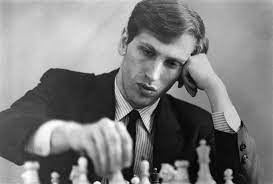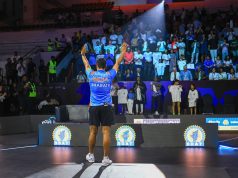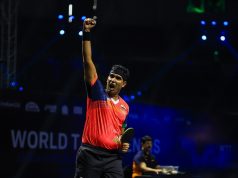In the series ‘Champions Born on this Date’, I am extremely delighted to write about none other than the legendary Grandmaster, Bobby Fischer.
[9th March 1943 – 17th January 2008]
Robert James (Bobby) Fischer’s journey through his complex life has always been a matter of great curiosity to everyone, even to those outside the Chess fraternity. His sudden rise and phenomenal conquests, controversial views-interviews, strange decisions in professional and personal life, have been subject to discussion, analysis and criticism all over the world. Due to his introvert nature, Fischer interacted with people only when absolutely necessary, and therefore, his personal life and true personality will always remain a mystery. However, clever and tactful journalists were able to get a lot of information on Fischer’s ideas and views because he never avoided a question and always replied what he believed to be correct.
Though Fischer had undergone only the basic school education of 2.5 years, he was extremely well informed than many of his contemporary Chess players and organisers. He was able to solve complex arithmetic and logic-based puzzles in a no time, something that always amazed the elite of the American society. Studies made in U.S.A. and Europe reveal that Fischer’s I.Q was above180 points, higher than that of a genius.
Despite Fischer’s eccentric nature, his contribution to Chess (in particular) and Sports, (in general), has been far beyond his Chess moves and games. His approach to Chess was absolutely professional and he did not shy away from facing any challenge that crossed his path. He strongly believed in ethics and strictly adhered to them. Though Fischer considered the ‘Soviets’ to be his enemies, he was the first Western Chess player to learn Russian in order to study the intricacies of the Soviet Chess School. Not only did he master the Soviet Chess School better than Soviet masters, Fischer even expanded the horizon of the Soviet Chess Strategy considerably. In words of five times world champion Mikhail Botvinnik “Fischer added ‘time element’ to Chess Strategy”.
In some of his uncommon opinions, (not shared or accepted by the contemporary Chess masters), Fischer often showed greater insight, depth and wisdom than others, particularly in judging the masters in the past. For example, while the world looked at Wilhelm Steinitz as ‘Father of Modern Chess Strategy’, Fischer considered Paul Morphy to be a much greater strategist, theoretician, visionary and even a practical player. Modern Chess playing engines have now proven that Paul Morphy’s way of playing Chess was the right one but what is remarkable is that Fischer sensed it over six decades ago, that too, when there were no Chess playing engines.
Fischer sensed the importance of good health, fitness and stamina very early in life. He was probably the first Western player who really played with optimal mental and physical energy throughout the game.
Like most of the gifted players, Fischer, too, believed in maintaining the originality and independent thinking in Chess games. Though he did work a lot preparing openings, he did not believe in taking help of trainers, consultants or ‘seconds’. In fact, Fischer is the only world champion in modern times who did not have a practice partner or a trainer. In his last interview (2005), Fischer had expressed displeasure about the modern ways of playing. His objection “Today’s Chess in mainly Prearrangement” was aimed against excessive opening preparation by modern players (variations analysed before the game with help from computers, trainers & assistants) which hampered their originality and creativity. However, Fischer did not hesitate to use ideas of ‘patzers’ (unskilled players) played even in ‘skittles’ (blitz), if he found them good. He had absolutely no ego, a fact which helped him play objectively in all positions. Fischer was very astute in judging his opponents and always succeeded in his taking his opponents ‘out of book’ (out of the path well known to them).
Though Fischer stopped playing tournament Chess immediately after becoming the world Champion in 1972, he continued to study Chess seriously and kept himself updated with the latest techniques throughout his lifetime. The 1992 Fischer-Spassky match reveals that Fischer had mastered the ‘closed Ruy Lopez’, a particular area which had undergone fundamental strategic changes in the late 1970s due to invaluable contributions by Anatoly Karpov – Fischer’s successor to the world Chess throne.
Fischer rarely made mistakes in Chess annotations and comments even in his bad days spent in asylum or jail. He had simply developed the ‘sixth sense’ in Chess.
Fischer always fought for conducive atmosphere and fair conditions to Chess players and got several positive changes made in the Chess world. Some of Fischer’s inventions, such as the concepts of ‘Fischer Chess Clock’ and ‘Fischer Random Chess’ (Chess 960) are practised regularly now. In fact, the ‘Fischer Clock’ has become an integral part of modern Chess. Recently Magnus Carlsen has revealed that he stopped playing world championship due to excessive preparation by opponents and has actually been advocating Chess 960.
Bobby Fischer always saw Chess Players as ambassadors of the game and himself lived as one till his last breath. That Fischer’s sad demise should occur when he was 64 years of age, is perhaps destiny’s unique way of acknowledging him as the perfect Chess player.




